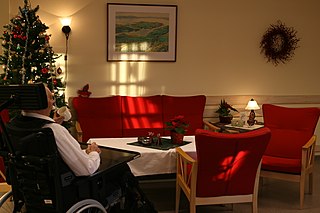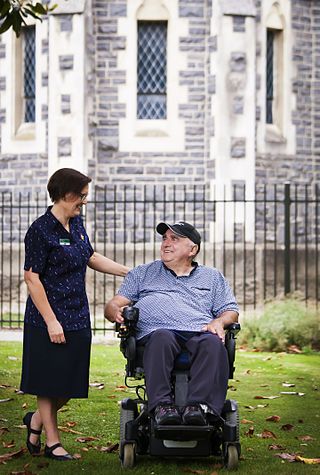Occupational therapists (OTs) are health care professionals specializing in occupational therapy and occupational science. OTs and occupational therapy assistants (OTAs) use scientific bases and a holistic perspective to promote a person's ability to fulfill their daily routines and roles. OTs have training in the physical, psychological, and social aspects of human functioning deriving from an education grounded in anatomical and physiological concepts, and psychological perspectives. They enable individuals across the lifespan by optimizing their abilities to perform activities that are meaningful to them ("occupations"). Human occupations include activities of daily living, work/vocation, play, education, leisure, rest and sleep, and social participation.
People with disabilities in the United States are a significant minority group, making up a fifth of the overall population and over half of Americans older than eighty. There is a complex history underlying the U.S. and its relationship with its disabled population, with great progress being made in the last century to improve the livelihood of disabled citizens through legislation providing protections and benefits. Most notably, the Americans with Disabilities Act is a comprehensive anti-discrimination policy that works to protect Americans with disabilities in public settings and the workplace.
Developmental disability is a diverse group of chronic conditions, comprising mental or physical impairments that arise before adulthood. Developmental disabilities cause individuals living with them many difficulties in certain areas of life, especially in "language, mobility, learning, self-help, and independent living". Developmental disabilities can be detected early on and persist throughout an individual's lifespan. Developmental disability that affects all areas of a child's development is sometimes referred to as global developmental delay.

Long-term care (LTC) is a variety of services which help meet both the medical and non-medical needs of people with a chronic illness or disability who cannot care for themselves for long periods. Long-term care is focused on individualized and coordinated services that promote independence, maximize patients' quality of life, and meet patients' needs over a period of time.

Movement for the Intellectually Disabled of Singapore (MINDS) is a voluntary welfare organisation based in Singapore, that provides services for the intellectually disabled. MINDS was founded in 1962, and remains one of the largest charities in Singapore. Over 600 staff and 2,400 beneficiaries are a part of MINDS. Two other organisations, the Association for Persons with Special Needs and Metta School were formed as an offshoot of MINDS.
The term sheltered workshop refers to an organization or environment that employs people with disabilities separately from others, usually with exemptions from labor standards, including but not limited to the absence of minimum wage requirements.
A mental health professional is a health care practitioner or social and human services provider who offers services for the purpose of improving an individual's mental health or to treat mental disorders. This broad category was developed as a name for community personnel who worked in the new community mental health agencies begun in the 1970s to assist individuals moving from state hospitals, to prevent admissions, and to provide support in homes, jobs, education, and community. These individuals were the forefront brigade to develop the community programs, which today may be referred to by names such as supported housing, psychiatric rehabilitation, supported or transitional employment, sheltered workshops, supported education, daily living skills, affirmative industries, dual diagnosis treatment, individual and family psychoeducation, adult day care, foster care, family services and mental health counseling.
A group home, congregate living facility, care home, adult family home, etc., is a structured and supervised residence model that provides assisted living and medical care for those with complex health needs. Traditionally, the model has been used for children or young people who cannot live with their families or afford their own homes, people with chronic disabilities who may be adults or seniors, or people with dementia and related aged illnesses. Typically, there are no more than six residents, and there is at least one trained caregiver there 24 hours a day. In some early "model programs", a house manager, night manager, weekend activity coordinator, and four part-time skill teachers were reported. Originally, the term group home referred to homes of 8 to 16 individuals, which was a state-mandated size during deinstitutionalization. Residential nursing facilities, also included in this article, may be as large as 100 individuals in 2015, which is no longer the case in fields such as intellectual and developmental disabilities. Depending on the severity of the condition requiring one to need to live in a group home, some clients are able to attend day programs and most clients are able to live normal lifestyles.
Respite care is planned or emergency temporary care provided to caregivers of a child or adult.

A caregiver, carer or support worker is a paid or unpaid person who helps an individual with activities of daily living. Caregivers who are members of a care recipient's family or social network, and who may have no specific professional training, are often described as informal caregivers. Caregivers most commonly assist with impairments related to old age, disability, a disease, or a mental disorder.
Supported employment refers to service provisions wherein people with disabilities, including intellectual disabilities, mental health, and traumatic brain injury, among others, are assisted with obtaining and maintaining employment. Supported employment is considered to be one form of employment in which wages are expected, together with benefits from an employer in a competitive workplace, though some versions refer to disability agency paid employment. Companies such as Skilcraft in the United States are an example of "supported employment" which is defined in law for state and federal reimbursements.

Intellectual disability (ID), also known as general learning disability in the United Kingdom and formerly mental retardation, is a generalized neurodevelopmental disorder characterized by significantly impaired intellectual and adaptive functioning. It is defined by an IQ under 70, in addition to deficits in two or more adaptive behaviors that affect everyday, general living. Intellectual functions are defined under the DSM-5 as reasoning, problem‑solving, planning, abstract thinking, judgment, academic learning, and learning from instruction and experience, and practical understanding confirmed by both clinical assessment and standardized tests. Adaptive behavior is defined in terms of conceptual, social, and practical skills involving tasks performed by people in their everyday lives.
A professional live-in caregiver provides personal care and assistance to individuals, including those suffering from chronic illness, Alzheimer's disease, and dementia, within the home setting. Typical duties of a live-in caregiver include meal planning and preparation, assistance with grooming, dressing and toileting, medication management, laundry and light housekeeping, and transportation/escorts to doctor's appointments or social engagements. Professional live-in caregivers are often provided by an outside agency, which may also coordinate their services with the client's preferred in-home health agency and other medical providers.
Caregiver syndrome or caregiver stress is a condition that strongly manifests exhaustion, anger, rage, or guilt resulting from unrelieved caring for a chronically ill patient. This condition is not listed in the United States' Diagnostic and Statistical Manual of Mental Disorders, although the term is often used by many healthcare professionals in that country. The equivalent used in many other countries, the ICD-11, does include the condition.
Unlicensed assistive personnel (UAP) are paraprofessionals who assist individuals with physical disabilities, mental impairments, and other health care needs with their activities of daily living (ADLs). UAPs also provide bedside care—including basic nursing procedures—all under the supervision of a registered nurse, licensed practical nurse or other health care professional. UAPs must demonstrate their ability and competence before gaining any expanded responsibilities in a clinical setting. While providing this care, UAPs offer compassion and patience and are part of the patient's healthcare support system. Communication between UAPs and registered nurses (RNs) is key as they are working together in their patients' best interests. The scope of care UAPs are responsible for is delegated by RNs or other clinical licensed professionals.
In the United States there are approximately 50 million people who are caring at home for family members including elderly parents, and spouses and children with disabilities and/or chronic illnesses. Without this home-care, most of these cared for would require permanent placement in institutions or health care facilities.
Family support is the support of families with a member with a disability, which may include a child, an adult, or even the parent in the family. In the United States, family support includes "unpaid" or "informal" support by neighbors, families, and friends, "paid services" through specialist agencies providing an array of services termed "family support services", school or parent services for special needs such as respite care, specialized child care or peer companions, or cash subsidies, tax deductions or other financial subsidies. Family support has been extended to different population groups in the US and worldwide. Family support services are currently a "community services and funding" stream in New York and the US which has had variable "application" based on disability groups, administrating agencies, and even, regulatory and legislative intent.
The Eldercare Workforce Alliance (EWA), a project of the Tides Center, is a coalition of 35 US national organizations that came together to focus on short- and long-term healthcare workforce issues relating to older adults. The Alliance helped pass the 2018 Raise Family Caregivers Act, supports ongoing funding for the Title VII Geriatrics Workforce Enhancement Program, and advocates for including elder care in government and professional policies, including related questions of educating and maintaining the labor force such care requires.
As of 2017, approximately 1.4 million Americans live in a nursing home, two-thirds of whom rely on Medicaid to pay for their care. Residential nursing facilities receive Medicaid federal funding and approvals through a state health department. These facilities may be overseen by various types of state agency.



